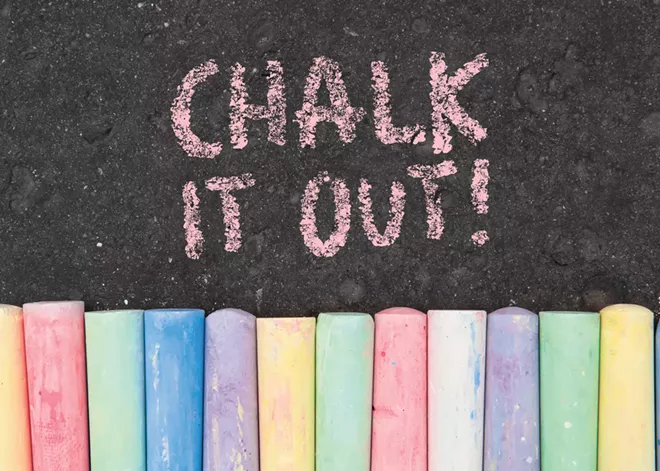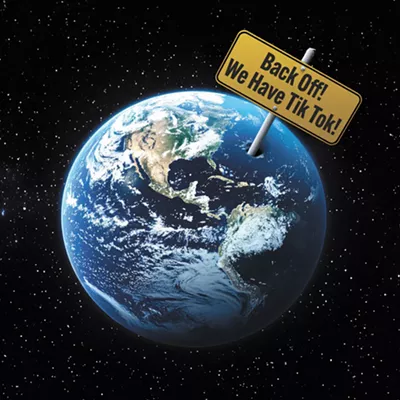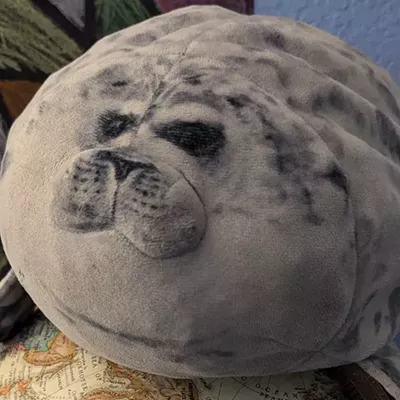My friend M's mother is embroiled in an ideological war of words — via sidewalk chalk. M's mom lives in a small Pacific Northwest city with a lovely walking path. Someone has been leaving political and religious messages along the path, and M's mom has started writing replies. Sometimes she argues. Sometimes she's snarky. Once, when the other writer suggested visiting a website, she just responded, "NO."
I was totally charmed when I heard this story, imagining this affable, somewhat gruff retired grandma popping a piece of chalk in her pocket before her morning walk, prepared for battle.
Like a few million other folks, I recently abandoned the sinking ship of Twitter. (Ugh, X.)
I'd been on the platform for more than a decade after being sucked in at a science writing conference, and for a long time it was a meaningful place. I connected with fellow writers and Idahoans, met people who shared the uncommon jobs I've had over the years, built networks where we traded real ideas, insights, and jokes. I made actual friends there, including several I've met in person.
But it had become a place riddled with junk, where most of the "interactions" were with trolls, scammers and spambots — as on so much of the internet. According to the 2024 Imperva Bad Bot Report, almost half of global internet traffic is now automated bots, with more charging in as generative AI explodes.
What I love most about the story of M's mom and the sidewalk messages is what I miss about pre-Elon Musk Twitter: the humanity of it.
M's mom's rival is definitely a real person. I imagine her as a woman, maybe also a retiree, maybe a young mom with a toddler in a stroller. She might be influenced by bot-spread disinformation online — but at some point in the day, she puts down her phone, picks up her chalk, and heads out to the walking path.
The mindless hordes online are built by people, and real humans absorb, believe and amplify their insidious messages. Plenty of times, the worst of online discourse involves no bots at all, just humans being nasty, cruel and violent. The common factor is that none of these people ever have to see the people they hurt, which makes it much easier to dehumanize them.
M's mom and her rival have to chalk out their messages while other people walk by. When they dust off their hands and leave, they know that other living, breathing humans will see what they wrote.
A huge amount of conversation right now, at least in my bubble, is about how, or whether, to engage with fellow Americans when you deeply disagree. I tend to fall on the side of maintaining relationships within boundaries, knowing that honoring the humanity of another person doesn't require agreeing with them (and can involve actively disagreeing), and that the thing most likely to change someone's mind on an issue is trusting someone who believes differently.
But that, like most things, is a lot easier to philosophize about than actually do.
I remind myself that part of what makes conversation in polarized America so difficult is that there are a few powerful people who very deliberately set out to sow mistrust among the rest of us.
As New Yorker writer Jill Lepore put it in her excellent recent essay, "The Artificial State": "In the virtual political reality of the twenty-first century, much of public discourse is controlled by private corporations that manufacture, and profit from, political extremism."
In other words: There are people who make a ton of money off of hate and fear. And the inhumanity of the internet makes it the perfect place to do it.
When I used to advise student journalists, I encouraged them to be mindful of what they said online by asking them to imagine announcing it from a stage in our school football stadium. I wanted them to remember how many people could be affected by their words.
But I think a better analogy is M's mom and the sidewalk chalk. Would you be willing to go out and put this message physically into the world? Would you be willing to write it to one other person, a person you might stand in line with at the grocery store, or who might take care of you in the emergency room, or whose grandkids might play with yours?
Maybe the answer is still yes. After all, the original chalker is going strong, with M's mom gleefully writing back.
But I like to think that if M's mom was walking on the path someday and caught her rival in the act, she would see someone trying to connect — to share a message she thinks is important for real people, even if M's mom thinks it's absurd.
And if M's mom held up her own piece of chalk, her rival might see someone who's arguing with her not because she's a faceless object, but because she's someone whose life might actually intersect with her own.
I don't imagine them suddenly becoming besties, heading out for coffee and resolving all their differences. But I like to imagine them smiling, recognizing each other as neighbors. ♦
Tara Roberts is a writer who lives in Moscow with her husband and sons. Her novel Wild and Distant Seas was published in January. Follow her on Bluesky and Instagram @tarabethidaho.




















